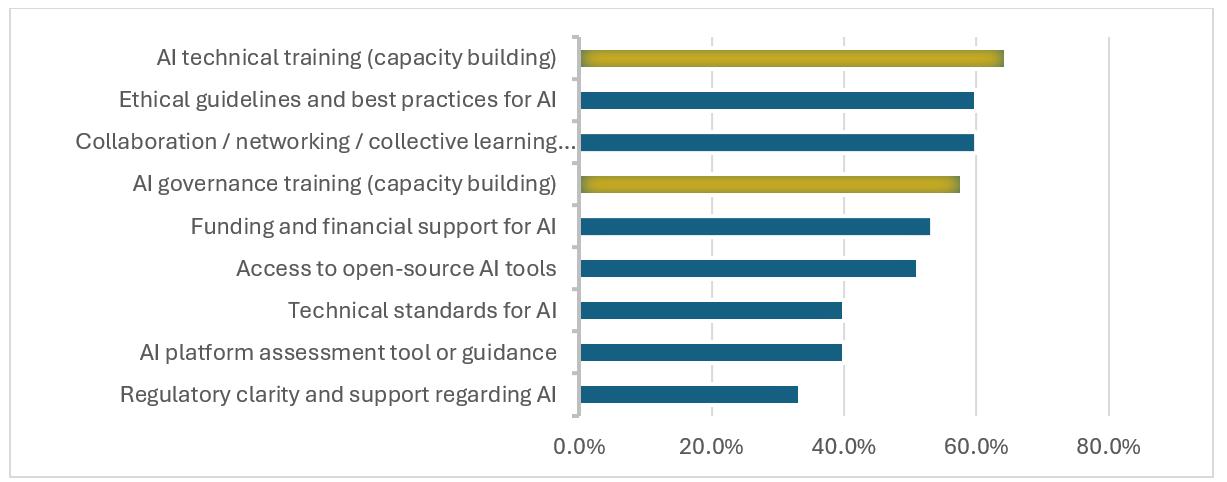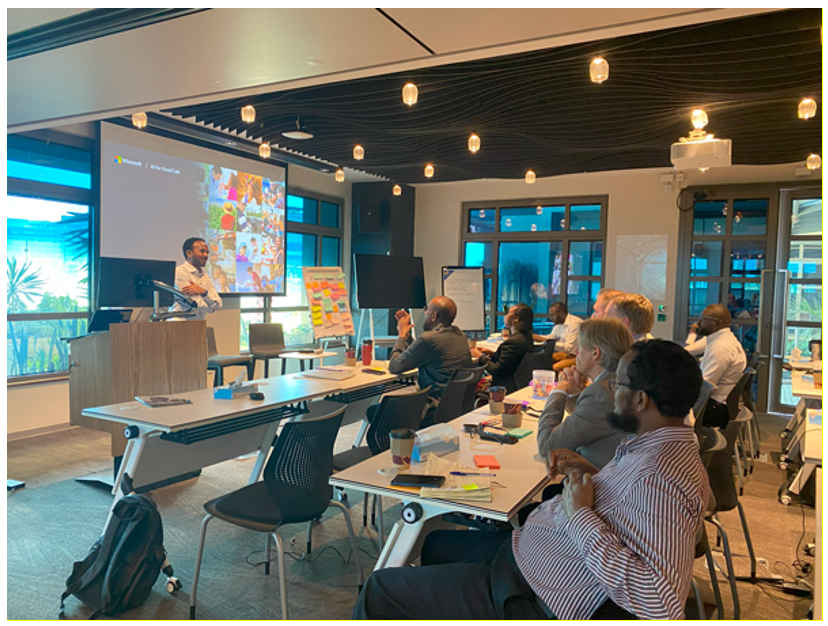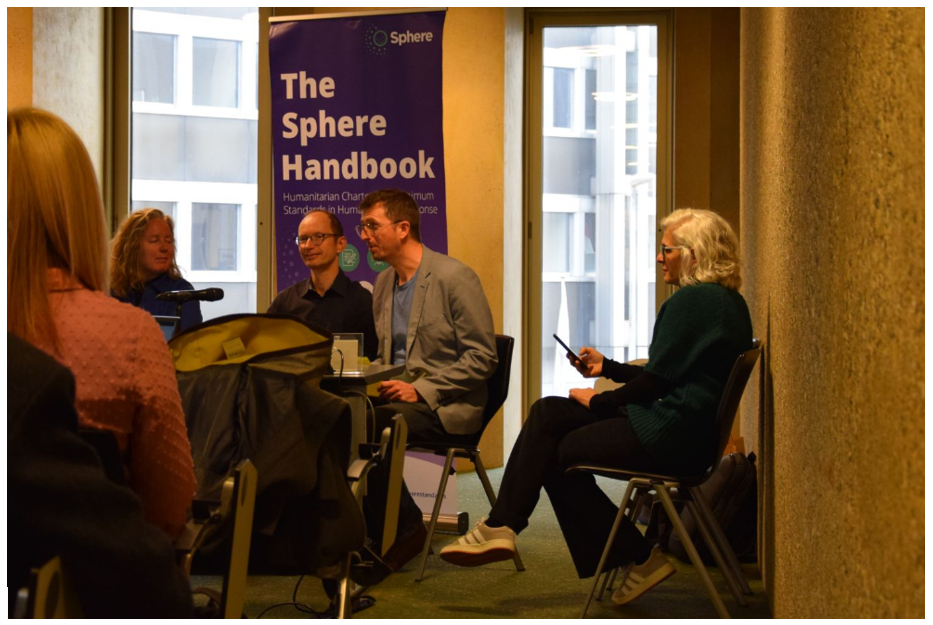AI Literacy Training for Humanitarians
In response to growing demand from the sector, Sphere and RedR UK launched a new training workshop ‘AI literacy for humanitarians’ in June 2025. Tristan Hale, Director of Operations, explains how and why Sphere engaged in this worksteam, and invites all humanitarian organisations to get involved.
Background
In 2024, Sphere worked with Nesta (an innovation agency for social good), Data Friendly Space, and CDAC Network – supported by FCDO and the UKHIH – on scoping an AI Safety Label (read more: How can humanitarian organisations use AI safely?).
From research conducted during this project, Sphere identified a strong appetite for AI training among humanitarians. In response to the question ‘What support do you think would be most beneficial to help your organisation make good decisions about use of AI?’, AI technical training was the top result – supported by 64% of all respondents – with AI governance training in fourth place.

64% of humanitarians surveyed would like training on how to make good decisions regarding the use of AI
Further analysis
While demand for AI training is strong across the sector, Sphere found significant differences when cross-referencing this question. Larger organisations (often international) are more likely to be using AI already, have AI usage policies, have AI experts among their staff, and be providing internal AI training for staff – as well as replacing staff with AI in some cases.
We observed that once humanitarians have a basic understanding of AI, their support priorities evolve from training to other things, for example:
- Among people working for international NGOs, the top demand – requested by 71% of respondents in this category – was Ethical guidelines and best practices for AI; and
- Among people with a good knowledge of AI, the top support was Funding and financial support for AI, requested by 86% of respondents in this category.
The data points to an increasing digital divide, where many larger organisations feel ready to invest further in AI and/or invest in exploring the ethics of doing so, while smaller organisations are not sure how to start their AI journey.
First steps
Realising that humanitarians, especially those in smaller organisations, needed basic AI literacy training, Sphere looked around for existing resources. While there are many AI training resources available, including many free online courses, Sphere found very little designed for non-profits, and even less specifically for humanitarians[1].
We found no-one offering instructor-led AI literacy courses – online or in-person – specifically for humanitarians, so this is what we set out to provide.
To start the journey, Sphere organised a one-day workshop in Kenya in February 2025 (the day before Elrha’s HIF event), hosted by Microsoft, which brought together experts to design what AI literacy training for humanitarians should look like. We recorded the outcomes and made this available to everyone.

Girmaw Tadesse presents examples of projects that Microsoft’s AI for Good Lab is undertaking in Africa
New partnerships
With a template for AI literacy training for humanitarians in hand, Sphere extended its long-term partnership with RedR – a leader in humanitarian training and a founding member of Sphere – to develop this design brief into a training package. Victoria Webbe from RedR UK – who had recently developed How to use The Sphere Handbook and Nature-based Solutions for Humanitarians online courses for Sphere – stepped up.
Sphere than partnered with RedR, the Humanitarian Leadership Academy (HLA), and Microsoft to organise an event at UNOCHA’s Humanitarian Networks and Partnerships Weeks (HNPW) in Geneva: AI for humanitarians – an introductory workshop. After a 45-minute panel session, Victoria led our in-person guests in a practical group activity selected from the new materials.

From left to right, Bernadette Sexton (RedR), Primo Amrein (Microsoft), and Tristan Hale (Sphere) speak at a panel hosted by Ana Pinto de Oliveira (University of Algarve)
Following the event, we invited everyone that registered to get in touch if they were interested in experiencing the full one-day training. The response didn’t disappoint!
Pilot workshops in Romania
Mariana Arnautu with Sphere focal point World Vision Romania and Martine Van Der Does with IIHA were among those who got in touch, and together with Victoria we put together two in-person workshops in Isai and Bucharest in June.

AI literacy for humanitarians workshops in Iasi and Bucharest, Romania, June 2025
Next steps and call to action
Sphere has a long history of training dissemination. Over 100 Sphere Training of Trainers (ToT) programmes over 28 years means there are now several hundred Sphere workshops per year.
The team behind the Romania workshops is planning to run the first AI Literacy for Humanitarians ToT later this year. To get involved in the ToT, or to organise an AT literacy workshop for your team, please get in touch: communications@spherestandards.org
[1] Community Crisis Intelligence is a free online course – provided by Nesta’s Centre for Collective Intelligence Design, Data Friendly Space, CDAC Network, and Humanitarian Leadership Academy – which provides a useful introduction to AI for humanitarians: https://kayaconnect.org/course/info.php?id=9112
The Artificial Intelligence (AI) Suitability Toolkit for Nonprofits – provided by NetHope – is a workshop guide for a one-day workshop to “increase NGOs’ internal expertise and capacity to evaluate, develop, procure, and use AI / Machine Learning (ML)”: https://nethope.org/toolkits/the-artificial-intelligence-ai-suitability-toolkit-for-nonprofits/
Patrick J McGovern Foundation’s (PJMF) Learning Hub is also worth a look: https://learn.mcgovern.org/
